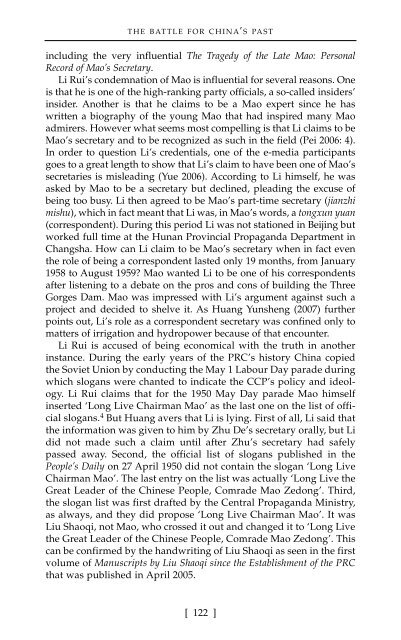Battle for China's Past : Mao and the Cultural Revolution
Battle for China's Past : Mao and the Cultural Revolution
Battle for China's Past : Mao and the Cultural Revolution
Create successful ePaper yourself
Turn your PDF publications into a flip-book with our unique Google optimized e-Paper software.
THE BATTLE FOR CHINA’ S PAST<br />
including <strong>the</strong> very influential The Tragedy of <strong>the</strong> Late <strong>Mao</strong>: Personal<br />
Record of <strong>Mao</strong>’s Secretary.<br />
Li Rui’s condemnation of <strong>Mao</strong> is influential <strong>for</strong> several reasons. One<br />
is that he is one of <strong>the</strong> high-ranking party officials, a so-called insiders’<br />
insider. Ano<strong>the</strong>r is that he claims to be a <strong>Mao</strong> expert since he has<br />
written a biography of <strong>the</strong> young <strong>Mao</strong> that had inspired many <strong>Mao</strong><br />
admirers. However what seems most compelling is that Li claims to be<br />
<strong>Mao</strong>’s secretary <strong>and</strong> to be recognized as such in <strong>the</strong> field (Pei 2006: 4).<br />
In order to question Li’s credentials, one of <strong>the</strong> e-media participants<br />
goes to a great length to show that Li’s claim to have been one of <strong>Mao</strong>’s<br />
secretaries is misleading (Yue 2006). According to Li himself, he was<br />
asked by <strong>Mao</strong> to be a secretary but declined, pleading <strong>the</strong> excuse of<br />
being too busy. Li <strong>the</strong>n agreed to be <strong>Mao</strong>’s part-time secretary (jianzhi<br />
mishu), which in fact meant that Li was, in <strong>Mao</strong>’s words, a tongxun yuan<br />
(correspondent). During this period Li was not stationed in Beijing but<br />
worked full time at <strong>the</strong> Hunan Provincial Propag<strong>and</strong>a Department in<br />
Changsha. How can Li claim to be <strong>Mao</strong>’s secretary when in fact even<br />
<strong>the</strong> role of being a correspondent lasted only 19 months, from January<br />
1958 to August 1959? <strong>Mao</strong> wanted Li to be one of his correspondents<br />
after listening to a debate on <strong>the</strong> pros <strong>and</strong> cons of building <strong>the</strong> Three<br />
Gorges Dam. <strong>Mao</strong> was impressed with Li’s argument against such a<br />
project <strong>and</strong> decided to shelve it. As Huang Yunsheng (2007) fur<strong>the</strong>r<br />
points out, Li’s role as a correspondent secretary was confined only to<br />
matters of irrigation <strong>and</strong> hydropower because of that encounter.<br />
Li Rui is accused of being economical with <strong>the</strong> truth in ano<strong>the</strong>r<br />
instance. During <strong>the</strong> early years of <strong>the</strong> PRC’s history China copied<br />
<strong>the</strong> Soviet Union by conducting <strong>the</strong> May 1 Labour Day parade during<br />
which slogans were chanted to indicate <strong>the</strong> CCP’s policy <strong>and</strong> ideology.<br />
Li Rui claims that <strong>for</strong> <strong>the</strong> 1950 May Day parade <strong>Mao</strong> himself<br />
inserted ‘Long Live Chairman <strong>Mao</strong>’ as <strong>the</strong> last one on <strong>the</strong> list of official<br />
slogans. 4 But Huang avers that Li is lying. First of all, Li said that<br />
<strong>the</strong> in<strong>for</strong>mation was given to him by Zhu De’s secretary orally, but Li<br />
did not made such a claim until after Zhu’s secretary had safely<br />
passed away. Second, <strong>the</strong> official list of slogans published in <strong>the</strong><br />
People’s Daily on 27 April 1950 did not contain <strong>the</strong> slogan ‘Long Live<br />
Chairman <strong>Mao</strong>’. The last entry on <strong>the</strong> list was actually ‘Long Live <strong>the</strong><br />
Great Leader of <strong>the</strong> Chinese People, Comrade <strong>Mao</strong> Zedong’. Third,<br />
<strong>the</strong> slogan list was first drafted by <strong>the</strong> Central Propag<strong>and</strong>a Ministry,<br />
as always, <strong>and</strong> <strong>the</strong>y did propose ‘Long Live Chairman <strong>Mao</strong>’. It was<br />
Liu Shaoqi, not <strong>Mao</strong>, who crossed it out <strong>and</strong> changed it to ‘Long Live<br />
<strong>the</strong> Great Leader of <strong>the</strong> Chinese People, Comrade <strong>Mao</strong> Zedong’. This<br />
can be confirmed by <strong>the</strong> h<strong>and</strong>writing of Liu Shaoqi as seen in <strong>the</strong> first<br />
volume of Manuscripts by Liu Shaoqi since <strong>the</strong> Establishment of <strong>the</strong> PRC<br />
that was published in April 2005.<br />
[ 122 ]
















